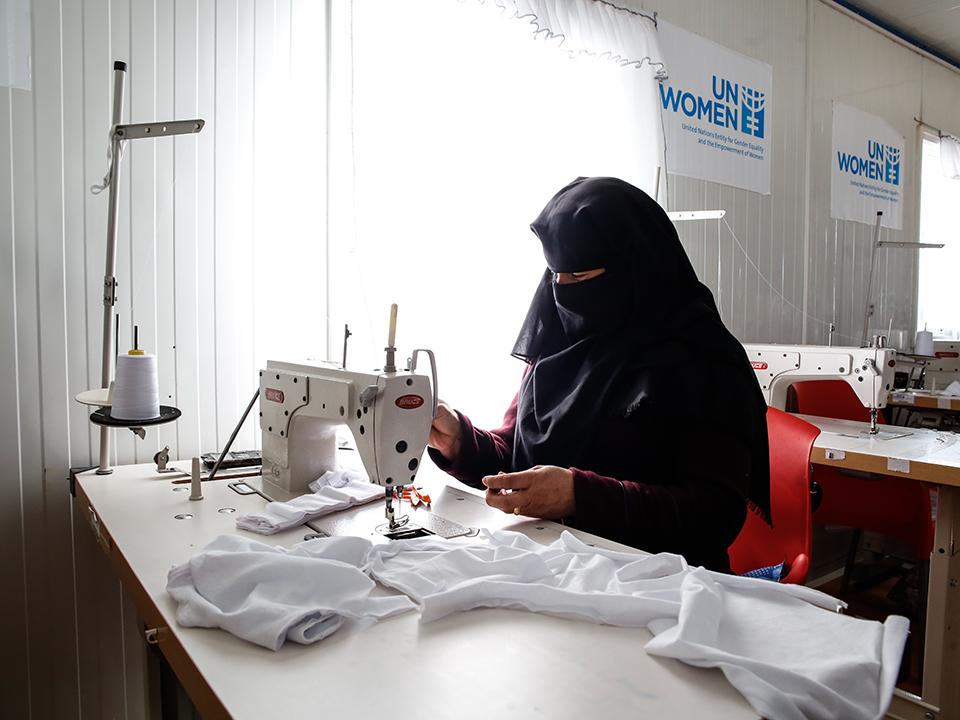From where I stand: “My husband would not allow me to leave the house, now I’m financially independent”
Date:
Ten years since the beginning of the conflict in Syria, refugee women continue to face multiple challenges during displacement. Home to 36,657 refugees, in the Azraq refugee camp 1 in 4 households are headed by women1. Noor Ali Halam*, from Dara’a, is one of them and, since 2017 she is the sole provider for her six children. At the UN Women’s Oasis center, she was able to find her first job and the support network she needed to rebuild her life.

![]() I have never lived my own life, until now.
I have never lived my own life, until now.
At the age of 12 my parents pulled me out of school. ‘A woman should not go to school’ they said. Soon after I was married, and my husband would not allow me to leave the house, ‘your duty is in the home’ he would say. I felt like a puppet, depending on their opinions and decisions for most of my life.
In 2014, my husband fled from Syria, leaving me and my six children behind to provide for ourselves. Despite the hardship that I faced during that time, I felt I grew stronger and it gave me the first taste of independence that I have ever had in my life.
A year later, with the conflict worsening, my husband asked me to reunite, and I decided to join him in Jordan for the safety of my children. It was not an easy journey. I felt tired, drained, and anxious about what would have come next. When we arrived into a bustling city in Jordan, my husband guided us to his small apartment where, to my surprise, he was already living with a new wife.
I felt trapped again and walked back into a life where I was no longer in control. I wanted to scream ‘No! This is not a life I wish to live!’.
Two years later, my husband struggled to find work and could no longer afford to support two families. Also, he did not want me to find a job. That is when I made the decision to leave and move to the Azraq refugee camp, with one small hope of finding an opportunity to provide for my children. It was time to take control of my life.
A dream come true when I got my position as a tailor in the (UN Women) Oasis center.
I love my job! Not only have I become financially independent and can provide for my family, but I have also found a strong support network here. Beyond useful job skills, I have learned the importance of women’s empowerment and enabling other women to stand up for their rights.
I was deprived from my rights throughout my life. For too long I remained silent, and this allowed others to limit my freedoms. If we remain silent, nothing will change for us or for our daughters.
Now, I want to share my story and ensure other women and my own daughters do not face the same. It is time for women to make their own decisions! Being a refugee or not, every woman must have her own independence as she has the right to speak up for herself, to say no or to say yes, seizing her own future.”
With the generous support of the Government of Japan through the ’Women’s Leadership, Empowerment, Access and Protection in Crisis Response’ (LEAP) programme, and the Central Emergency Response Fund (CERF), UN Women is providing livelihood opportunities to more than 4,000 vulnerable women every year. UN Women is also leveraging blockchain technology to provide direct cash assistance to vulnerable Syrian refugees to meet emerging needs during the COVID-19 outbreak. Noor’s story relates to Sustainable Development Goal (SDG) 16, on promoting peace and security, SDG 5 on gender equality and the empowerment of women, as well as SDG 8, on full and productive employment and decent work.
*Note: The name has been changed to protect the identity of the survivor.